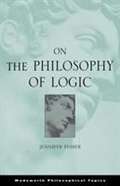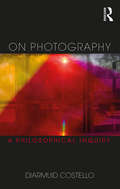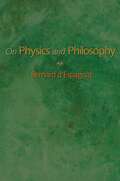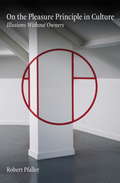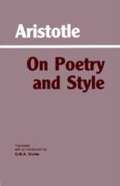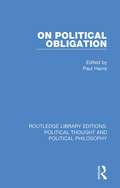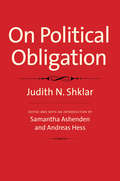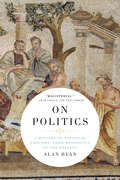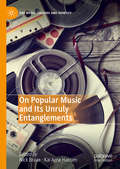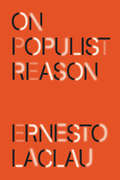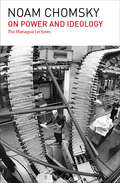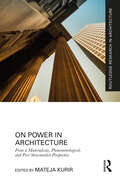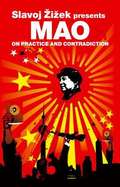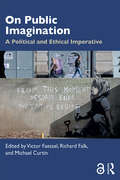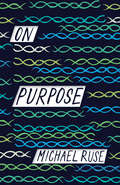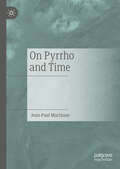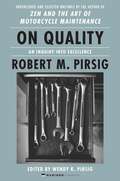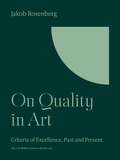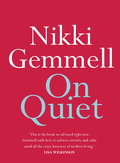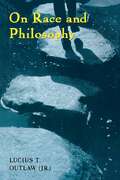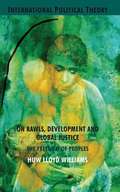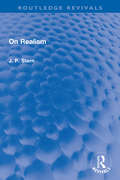- Table View
- List View
On The Philosophy Of Logic
by Jennifer FisherJennifer Fisher's ON THE PHILOSOPHY OF LOGIC explores questions about logic often overlooked by philosophers. Which of the many different logics available to us is right? How would we know? What makes a logic right in the first place? Is logic really a good guide to human reasoning? An ideal companion text for any course in symbolic logic, this lively and accessible book explains important logical concepts, introduces classical logic and its problems and alternatives, and reveals the rich and interesting philosophical issues that arise in exploring the fundamentals of logic. THE WADSWORTH PHILOSOPHICAL TOPICS SERIES (under the general editorship of Robert Talisse, Vanderbilt University) presents readers with concise, timely, and insightful introductions to a variety of traditional and contemporary philosophical subjects. With this series, students of philosophy will be able to discover the richness of philosophical inquiry across a wide array of concepts, including hallmark philosophical themes and themes typically underrepresented in mainstream philosophy publishing. Written by a distinguished list of scholars who have garnered particular recognition for their excellence in teaching, this series presents the vast sweep of today's philosophical exploration in highly accessible and affordable volumes. These books will prove valuable to philosophy teachers and their students as well as to other readers who share a general interest in philosophy.
On Photography: A Philosophical Inquiry
by Diarmuid CostelloWhat is photography? Is it a source of knowledge or an art? Many have said the former because it records the world automatically, others the latter because it expresses human subjectivity. Can photography be both or must we choose? In On Photography: A Philosophical Inquiry, Diarmuid Costello examines these fascinating questions and more, drawing on images by Alfred Stieglitz, Berenice Abbott, Paul Strand, Lee Friedlander, James Welling, and Wolfgang Tillmans, among others, and the writings of Elizabeth Eastlake, Peter Henry Emerson, Edward Weston, Siegfried Kracauer, André Bazin, and Stanley Cavell. This sets the scene for the contemporary stand-off between "sceptical" and "non-sceptical" Orthodoxy in the work of Roger Scruton and Kendall Walton, and a New Theory of Photography taking its cue from László Moholy-Nagy and Patrick Maynard. Written in a clear and engaging style, On Photography is essential reading for anyone interested in the philosophy of photography, aesthetics, art, and visual studies.
On Physics and Philosophy
by Bernard d'EspagnatAmong the great ironies of quantum mechanics is not only that its conceptual foundations seem strange even to the physicists who use it, but that philosophers have largely ignored it. Here, Bernard d'Espagnat argues that quantum physics--by casting doubts on once hallowed concepts such as space, material objects, and causality-demands serious reconsideration of most of traditional philosophy. On Physics and Philosophy is an accessible, mathematics-free reflection on the philosophical meaning of the quantum revolution, by one of the world's leading authorities on the subject. D'Espagnat presents an objective account of the main guiding principles of contemporary physics-in particular, quantum mechanics-followed by a look at just what consequences these should imply for philosophical thinking. The author begins by describing recent discoveries in quantum physics such as nonseparability, and explicating the significance of contemporary developments such as decoherence. Then he proceeds to set various philosophical theories of knowledge--such as materialism, realism, Kantism, and neo-Kantism--against the conceptual problems quantum theory raises. His overall conclusion is that while the physical implications of quantum theory suggest that scientific knowledge will never truly describe mind-independent reality, the notion of such an ultimate reality--one we can never access directly or rationally and which he calls "veiled reality"--remains conceptually necessary nonetheless.
On The Pleasure Principle In Culture
by Robert PfallerFor many illusions, it is easy to find owners - people who proudly declare that they believe in things such as life after death, human reason, and self-regulation of financial markets. Yet there are also different kinds of illusions at work, for example, in art: trompe l'oeil-painting pleases its observers with "anonymous illusions" - illusions where it is not entirely clear who exactly it is that should be deceived.Anonymous illusions offer a universal pleasure principle within culture: they are present in games, sport, design, eroticism, manners, charm, beauty, etc. However it seems that this pleasure principle is increasingly subjected to misrecognition: the proud proprietors of certain illusions are no longer capable of recognizing that they too follow anonymous illusions. As a consequence, they mistake happy, polite others for naïve idiots or "savages" - as owners of stupid illusions; and consider their happiness an obscene intrusion - as something in which they could never share.Pfaller explores the strange properties of these shared illusions, and finds that they have a central and crucial role in our culture--and we need to better understand them in order to protect the public sphere.
On Poetry and Style
by Aristotle G. M. A. Grube Donald J. ZeylContains the Poetics and the first twelve chapters of the Rhetoric , Book III.
On Political Obligation (Routledge Library Editions: Political Thought and Political Philosophy #26)
by Paul HarrisFirst published in 1990. The individual’s obligation to obey the law, the state and the government is a fundamental part of contemporary political theory. The contributors to this volume, drawn from a variety of disciplines including philosophy, political science and law, take a fresh look at the dilemmas of political obligation. They discuss the extent to which we should allow the need for conformity to override individual liberties, and ask whether individualism is indeed feasible without a highly developed sense of the ‘public interest’ or the ‘common good‘. The contrast between individualism and communitarianism is examined throughout the book. The contributors also look at the various means through which the state can coerce or persuade the individual to be obedient. The emphasis throughout this collection is on the substantive problems themselves, rather than on the way these issues have been addressed in the history of political thought. The book offers a number of different perspectives on political obligation, and will be valuable to students of moral, political, social and legal philosophy.
On Political Obligation
by Judith N. ShklarA compelling set of lectures on political obligation that contributes to ongoing debates in political theory and intellectual history This stimulating collection of lectures by the late Judith Shklar on political obligation is paired with a scholarly introduction that offers an overview of her life, illuminates the connections among her teaching, research, and publications, and explains why her lectures still resonate with us and contribute to current debates in political theory and intellectual history.
On Politics: From Herodotus to the Present (Liveright Classics Ser. #0)
by Alan RyanThree decades in the making, one of the most ambitious and comprehensive histories of political philosophy in nearly a century. Both a history and an examination of human thought and behavior spanning three thousand years, On Politics thrillingly traces the origins of political philosophy from the ancient Greeks to Machiavelli in Book I and from Hobbes to the present age in Book II. Whether examining Lord Acton's dictum that "absolute power corrupts absolutely" or explicating John Stuart Mill's contention that it is "better to be a human dissatisfied than a pig satisfied," Alan Ryan evokes the lives and minds of our greatest thinkers in a way that makes reading about them a transcendent experience. Whether writing about Plato or Augustine, de Toqueville or Thomas Jefferson, Ryan brings a wisdom to his text that illuminates John Dewey's belief that the role of philosophy is less to see truth than to enhance experience. With this unparalleled tour de force, Ryan emerges in his own right as one of the most influential political philosophers of our time.
On Popular Music and Its Unruly Entanglements: Blurring The Lines (Pop Music, Culture and Identity)
by Nick Braae Kai Arne HansenOn Popular Music and Its Unruly Entanglements comprises eleven essays that explore the myriad ways in which popular music is entwined within social, cultural, musical, historical, and media networks. The authors discuss genres as diverse as mainstream pop, hip hop, classic rock, instrumental synthwave, video game music, amateur ukelele groups, and audiovisual remixes, while also considering the music’s relationship to technological developments, various media and material(itie)s, and personal and social identity. The collection presents a range of different methodologies and theoretical positions, which results in an eclecticism that aptly demonstrates the breadth of contemporary popular music research. The chapters are divided into three major sections that address: wider theoretical and analytical issues (“Broad Strokes”), familiar repertoire or concepts from a new perspective (“Second Takes”), and the meanings to arise from music’s connections with other media forms (“Audiovisual Entanglements”).
On Populist Reason (Phronesis Ser.)
by Ernesto LaclauIn this highly original work Ernesto Laclau continues the philosophical and political exploration initiated in Hegemony and Socialist Strategy. Here he focuses on the construction of popular identities and how "the people" emerge as a collective actor. Skillfully combining theoretical analysis with a myriad of empirical references from numerous historical and geographical contexts he offers a critical reading of the existing literature on populism, demonstrating its dependency on the theorists of "mass psychology" such as Taine and Freud. He demonstrates the relation of populism to democracy and to the logic of representation, and differentiates his approach from the work of i ek, Hardt and Negri, and Ranciere. This book is essential reading for all those interested in the question of political identities in present-day societies.
On Posthuman War: Computation and Military Violence
by Mike HillTracing war&’s expansion beyond the battlefield to the concept of the human being itself As military and other forms of political violence become the planetary norm, On Posthuman War traces the expansion of war beyond traditional theaters of battle. Drawing on counterinsurgency field manuals, tactical manifestos, data-driven military theory, and asymmetrical-war archives, Mike Hill delineates new &“Areas of Operation&” within a concept of the human being as not only a social and biological entity but also a technical one.Delving into three human-focused disciplines newly turned against humanity, OnPosthuman War reveals how demography, anthropology, and neuroscience have intertwined since 9/11 amid the &“Revolution in Military Affairs.&” Beginning with the author&’s personal experience training with U.S. Marine recruits at Parris Island, Hill gleans insights from realist philosophy, the new materialism, and computational theory to show how the human being, per se, has been reconstituted from neutral citizen to unwitting combatant. As evident in the call for &“bullets, beans, and data,&” whatever can be parted out, counted, and reassembled can become war materiel. Hill shows how visible and invisible wars within identity, community, and cognition shift public-sphere activities, like racial identification, group organization, and even thought itself, in the direction of war. This shift has weaponized social activities against the very notion of society. On Posthuman War delivers insights on the latest war technologies, strategies, and tactics while engaging in questions poised to overturn the foundations of modern political thought.
On Power and Ideology: The Managua Lectures (Unica Ser.)
by Noam ChomskyOne of Noam Chomsky's most accessible books, On Power and Ideology is a product of his 1986 visit to Managua, Nicaragua, for a lecture series at Unversidad Centroamericana. Delivered at the height of U.S. involvement in the Nicaraguan civil war, this succinct series of lectures lays out the parameters of Noam Chomsky's foreign policy analysis.The book consists of five lectures on U.S. international and security policy. The first two lectures examine the persistent and largely homogenous features of U.S. foreign policy, and overall framework of order. The third discusses Central America and its foreign policy pattern. The fourth looks at U.S. national security and the arms race. And the fifth examines U.S. domestic policy.These five talks, conveyed directly to the people bearing the brunt of devastating U.S. foreign policy, make historic and exciting reading.
On Power in Architecture: From a Materialistic, Phenomenological, and Post-Structuralist Perspective (Routledge Research in Architecture)
by Mateja KurirArchitecture has always been a decisive manifestation of power. This volume represents an attempt to question and reflect on the relationship between power and architecture from three philosophical perspectives: materialistic, phenomenological and post-structuralist.This collection opens an interdisciplinary investigation that aims to reflect on architecture and its interconnectedness with power within philosophy and cultural theory at large while presenting these concepts using practical examples from the built environment. Internationally recognised authors – philosophers, architectural theorists and historians – Andrew Benjamin, Andrew Ballantyne, Mladen Dolar, Hilde Heynen, Nadir Lahiji, Jeff Malpas, Dean Komel, Elke Krasny, Robert Pfaller, Gerard Reinmuth, Luka Skansi, Douglas Spencer, Teresa Stoppani and Sven-Olov Wallenstein present their reflections in original unpublished essays and interviews. In the presented works, architecture is combined and transgressed by philosophy in a new discussion that focuses only on power. The contributions in this collection open a variety of architectural questions, one of the central among them being the impact of neoliberal capitalism on architecture. Architecture, with its implications on the complex contemporary political and social reality, is severely changing our space and, more globally, our environment. A reflection on the multilayered relation between architecture and power has never been as topical as it is today.This book will, therefore, be of interest to students, researchers and academics or professionals within the fields of architecture, philosophy, sociology, political sciences and cultural sciences.
On Practice and Contradiction
by Mao Tse-TungIn this dazzling new series, philosopher and cultural critic Slavoj Zizek interrogates key writings on revolution. These early philosophical writings underpinned the Chinese revolutions and their clarion calls to insurrection remain some of the most stirring of all time. Drawing on a dizzying array of references from contemporary culture and politics, Zizek's firecracker commentary reaches unsettling conclusions about the place of Mao's thought in the revolutionary canon. "Communism is not love. Communism is a hammer, which we use to crush the enemy." -- Mao Tse-Tung
On Preserving
by Bryson Brown Peter Schotch Raymond JenningsParaconsistent logic is a theory of reasoning in philosophy that studies inconsistent data. The discipline has several different schools of thought, including preservationism, which responds to the problems that arise when human beings continue to reason when faced with inconsistent data. On Preserving is the first complete account of the Preservationist School, which developed in Canada out of the early work of Raymond Jennings, Peter Schotch, and their students. Assembling the previously scattered works of the Preservationist School, this collection contains all of the most significant works on the basic theory of the preservationist approach to paraconsistent logic. With essays both written and rewritten specifically for this volume, the contributors cover topics that include the motivation for the preservationist approach, as well as more technical results of their research. Concise and unified, On Preserving is the ideal introduction to a distinct philosophical field.
On Privacy (Thinking in Action)
by Annabelle LeverThis book explores the Janus-faced features of privacy, and looks at their implications for the control of personal information, for sexual and reproductive freedom, and for democratic politics. It asks what, if anything, is wrong with asking women to get licenses in order to have children, given that pregnancy and childbirth can seriously damage your health. It considers whether employers should be able to monitor the friendships and financial affairs of employees, and whether we are entitled to know whenever someone rich, famous or powerful has cancer, or an adulterous affair. It considers whether we are entitled to privacy in public and, if so, what this might mean for the use of CCTV cameras, the treatment of the homeless and the provision of public facilities such as parks, libraries and lavatories. Above all, the book seeks to understand whether and, if so, why privacy is valuable in a democratic society, and what implications privacy has for the ways we see and treat each other. The ideas about privacy we have inherited from the past are marked by beliefs about what is desirable, realistic and possible which predate democratic government and, in some cases, predate constitutional government as well. Hence, this book argues, although privacy is an important democratic value, we can only realise that value if we use democratic ideas about the freedom, equality, security and rights of individuals to guide our understanding of privacy.
On Public Imagination: A Political and Ethical Imperative
by Michael Curtin Richard Falk Victor FaesselIn this wide-ranging and multidisciplinary volume, leading scholars, activists, journalists, and public figures deliberate about the creative and critical potential of public imagination in an era paradoxically marked by intensifying globalization and resurgent nationalism. Divided into five sections, these chapters explore the social, political, and cultural role of imagination and civic engagement, offering cogent, ingenious reflections that stand in stark contrast to the often grim rhetoric of our era. Short and succinct, the chapters engage with an interconnected ensemble of themes and issues while also providing insights into the specific geographical and social dynamics of each author’s national or regional context. • Part 1 introduces the reader to theoretical reflections on imagination and the public sphere; • Part 2 illustrates dynamics of public imagination in a diverse set of cultural contexts; • Part 3 reflects in various ways on the urgent need for a radically transformed public and civic imagination in the face of worldwide ecological crisis; • Part 4 suggests new societal possibilities that are related to spiritual as well as politically revolutionary sources of inspiration; • Part 5 explores characteristics of present and potentially emerging global society and the existing transnational framework that could provide resources for a more humane global order. Erudite and thought-provoking, On Public Imagination makes a vital contribution to political thought, and is accessible to activists, students, and scholars alike.
On Purpose
by Michael RuseA brief, accessible history of the idea of purpose in Western thought, from ancient Greece to the presentCan we live without the idea of purpose? Should we even try to? Kant thought we were stuck with purpose, and even Darwin’s theory of natural selection, which profoundly shook the idea, was unable to kill it. Indeed, teleological explanation—what Aristotle called understanding in terms of “final causes”—seems to be making a comeback today, as both religious proponents of intelligent design and some prominent secular philosophers argue that any explanation of life without the idea of purpose is missing something essential.In On Purpose, Michael Ruse explores the history of the idea of purpose in philosophical, religious, scientific, and historical thought, from ancient Greece to the present. Accessibly written and filled with literary and other examples, the book examines “purpose” thinking in the natural and human world. It shows how three ideas about purpose have been at the heart of Western thought for more than two thousand years. In the Platonic view, purpose results from the planning of a human or divine being; in the Aristotelian, purpose stems from a tendency or principle of order in the natural world; and in the Kantian, purpose is essentially heuristic, or something to be discovered, an idea given substance by Darwin’s theory of evolution through natural selection.On Purpose traces the profound and fascinating implications of these ways of thinking about purpose. Along the way, it takes up tough questions about the purpose of life and whether it’s possible to have meaning without purpose, revealing that purpose is still a vital and pressing issue.
On Pyrrho and Time
by Jean-Paul MartinonToday’s understanding of time remains mostly Aristotelian and Newtonian/Einsteinian: time is what has been abstracted from the mundane realities of life and reduced to its measurement. Any somatic, psychological, or other experience of time is deemed either irrelevant or secondary. The history of the attempts to provide alternatives to time as measurement is infinite, most of which focuses on understanding time as an inner-temporal phenomenon for which a subject temporalizes him or herself through remembrance, experience, or anticipation (including death). Amidst this vast field, one argument by an enigmatic figure in ancient Greek thought stands out for the way it abides by neither the conventional view that time is clock time nor that it is an inner temporal phenomenon: Aenesidemus’ overlooked way of apprehending time by qualifying it as similar to air. To make sense of such an unusual statement, it is necessary to reconsider what informs such an unusual idea. Aenesidemus’ teacher was Pyrrho (often dubbed the Greek Buddha) who advocated for a non-differential approach to reality, one for which nothing is fixed or stable. With this perspective in mind, Aenesidemus’ idea then becomes clear: time or air knows no differentiae, whether that of the unit of measure or of the subject breathing it and sheltering from it. Both are radically unstable. While these ideas had no purchase for over 2000 years, they can now be revealed in all their magnitude. In the last 120 years, we have indeed become aerial beings. We no longer scuttle around on the ground floor below an unsuspected ocean of air. We no longer aspire to shin a tree or scale a peak. We have now made a habitation of the air. Such a new dwelling has its own unique time, a time that strangely does not agree with the abstracted and/or calculated time that was formulated when we only had sundials and water-clocks at our disposal. Against time as measure and against time as inner-temporal phenomenon comes time as total instability. Can revisiting the few fragments that Pyrrho and his disciple left us help once again articulate our relation to time and give us a renewed sense of reality and who we are within it? This monograph focuses on early Pyrrhonism (as distinguished from the sceptical work of Sextus Empiricus), Pali Buddhism, as well as contemporary interpretations of time and reality in both science and philosophy.
On Quality: An Inquiry into Excellence: Unpublished and Selected Writings
by Robert M Pirsig Wendy K. PirsigFeaturing long-awaited selections from Robert M. Pirsig's unpublished writings, from before and after Zen and the Art of Motorcycle Maintenance, an original collection illuminating the central theme of Pirsig's thought: “Quality”“The ultimate goal in the pursuit of excellence is enlightenment." —Robert M. Pirsig, 1962More than a decade before the release of the book that would make him famous, Robert M. Pirsig had already caught hold of the central theme that would animate Zen and the Art of Motorcycle Maintenance: “Quality,” a concept loosely likened to “excellence,” “rightness,” or “fitness” that Pirsig saw as kindred to the Buddhist ideas of “dharma” or the “Tao.” As he later wrote in Zen, “Quality is the Buddha.”Though he was revered by fans who considered him a guru, the famously private Pirsig published only two books and consented to few interviews and almost no public appearances in later decades. Yet he wrote and thought almost continually, refining his “Metaphysics of Quality” until his death in 2017.Now, for the first time, readers will be granted access to five decades of Pirsig’s personal writings in this posthumous collection that illuminates the evolution of his thinking to an unprecedented degree. Skillfully edited and introduced by Wendy K. Pirsig, Robert’s wife of four decades, the collection includes previously unpublished texts, speeches, letters, interviews, and private notes, as well as key excerpts from Zen and the Art of the Motorcycle Maintenance and his second book, Lila.Since its publication in 1974, Zen and the Art of Motorcycle Maintenance has established itself as a modern classic of popular philosophy; selling millions of copies and inspiring a generation, while serving as a perennial touchstone for the generations that follow. On Quality is a remarkable contribution to our understanding of one of the most influential thinkers and writers of our time.
On Quality in Art: Criteria of Excellence, Past and Present (The A. W. Mellon Lectures in the Fine Arts #13)
by Jakob RosenbergAn acclaimed art historian explains how to identify excellence in artIn this book, Jakob Rosenberg takes up the timeless problem of how to make a valid judgment about artistic quality. In his search for criteria of excellence in art, Rosenberg examines both the achievements and failures of other critics from the Renaissance to modern times, including Giorgio Vasari, Roger de Piles, Sir Joshua Reynolds, Théophile Thoré, and Roger Fry. Drawing vital lessons from these critics’ writings, Rosenberg charts an effective approach to the challenges of judging quality in works of art by analyzing master drawings from the fifteenth to twentieth centuries and comparing them with examples of followers or minor contemporaries. The result is a set of practical criteria that are applicable across diverse periods and styles. Brimming with insights from a legendary art critic and historian, On Quality in Art sheds invaluable light on drawings by artists ranging from Dürer, Raphael, Leonardo, Rubens, Rembrandt, Watteau, Degas, and van Gogh to Matisse, Picasso, and Marin.
On Quiet
by Nikki GemmellInternationally bestselling author Nikki Gemmell writes on the power of quiet in today's shouty world. Quiet comes as a shock in these troubled times. Quietism means 'devotional contemplation and abandonment of the will ... a calm acceptance of things as they are'. Gemmell makes the case for why quiet is steadily gaining ground in this noisy age: Why we need it now more than ever. How to glean quiet, hold on to it, and work within it.
On Race and Philosophy
by Lucius OutlawOn Race and Philosophy is a collection of essays written and published across the last twenty years, which focus on matters of race, philosophy, and social and political life in the West, in particular in the US. These important writings trace the author's continuing efforts not only to confront racism, especially within philosophy, but, more importantly, to work out viable conceptions of raciality and ethnicity that are empirically sound while avoiding chauvinism and invidious ethnocentrism. The hope is that such conceptions will assist efforts to fashion a nation-state in which racial and ethnic cultures and identities are recognized and nurtured contributions to a more just and stable democracy.
On Rawls, Development and Global Justice
by Huw Lloyd WilliamsJohn Rawls' text The Law of Peoples has inspired extensive scholarly debate in the field of international political theory, since its publication in 1999. Responding to the arguments of cosmopolitan theorists and Amartya Sen's recent critique, this new work presents a fresh appraisal of the debate, and argues that Rawls offers a persuasive and prescient moral perspective on issues of global poverty and development. By elaborating one of Rawls' core ideas, 'the duty of assistance', the book offers a unique theoretical response to the ideal of global justice. The duty is presented as a far-reaching principle of justice, one that advocates increasing the state capability of burdened societies, and aims to compel the most powerful states to reform international structures and provide aid, in a constructive and culturally sensitive manner. The aim of assistance is the strengthening of democratic, or 'decent' indigenous institutions and the promotion of the freedom of peoples. On Rawls, Development and Global Justice is an original contribution to current debates on international redistribution, democracy promotion and global poverty.
On Realism (Routledge Revivals)
by J. P. SternFirst published in 1973, On Realism is a comprehensive introduction to the complex problem of literary realism. Written from both a critical and philosophical perspective, the book brings together the concrete study of literary cases and the conceptual analysis of the terms used in describing them. It uses examples drawn from a wide range of European literature and engages in philosophical discussion to argue for a richer and freer sense of the concept than was more commonly in favour at the time of writing. The book describes the literary forms of realism as an art of the 'middle distance' and sets out its character and value against alternatives and distortions - symbolism, naturalism, socialist realism, faits divers, and the literature of language consciousness. On Realism will appeal to those with an interest in literary history, the history of literary theory, and literature and philosophy.
